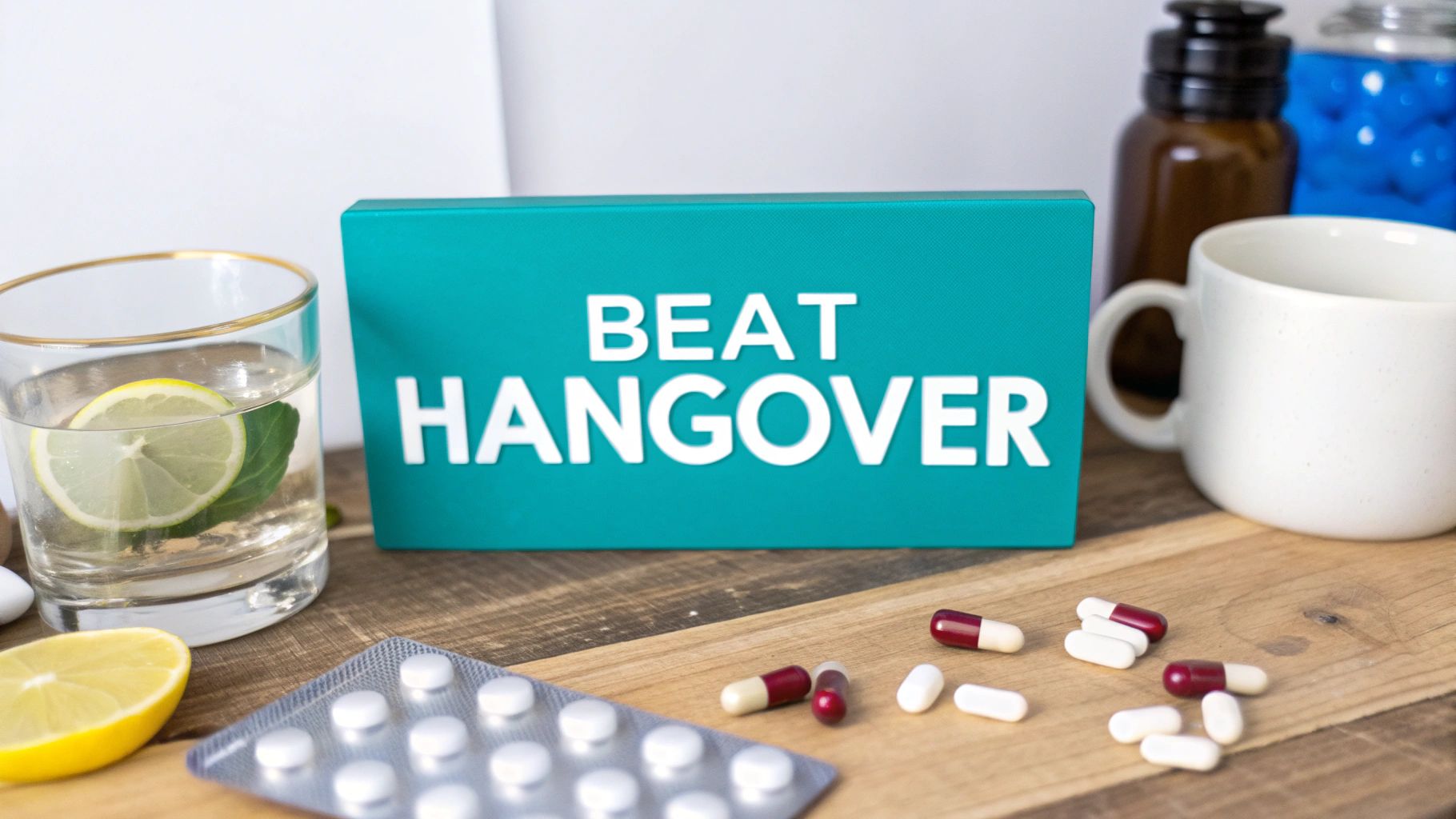

· By Annemarie
Top Hangover Cures That Work to Help You Recover Fast
Conquering the Dreaded Hangover
Waking up with a hangover can ruin your day. This listicle explores eight hangover cures that work, providing effective strategies to alleviate those dreaded morning-after symptoms. We'll cover everything from hydration and nutrition to specific supplements and lifestyle adjustments, offering real solutions, not just quick fixes some other sites promote. Learn how to combat headaches, nausea, and fatigue, and get back to feeling your best. This guide will empower you to take control of your recovery, so let's dive into the best hangover cures that work.
1. Hydration Therapy: A Proven Hangover Cure That Works
Among the plethora of hangover remedies, hydration therapy stands out as a scientifically-backed approach that directly addresses a root cause of those dreaded morning-after symptoms. Alcohol acts as a diuretic, increasing urination and depleting your body of vital fluids and electrolytes. This dehydration contributes significantly to common hangover woes like headaches, fatigue, and nausea. Hydration therapy focuses on replenishing these lost resources, helping your body recover and function optimally.
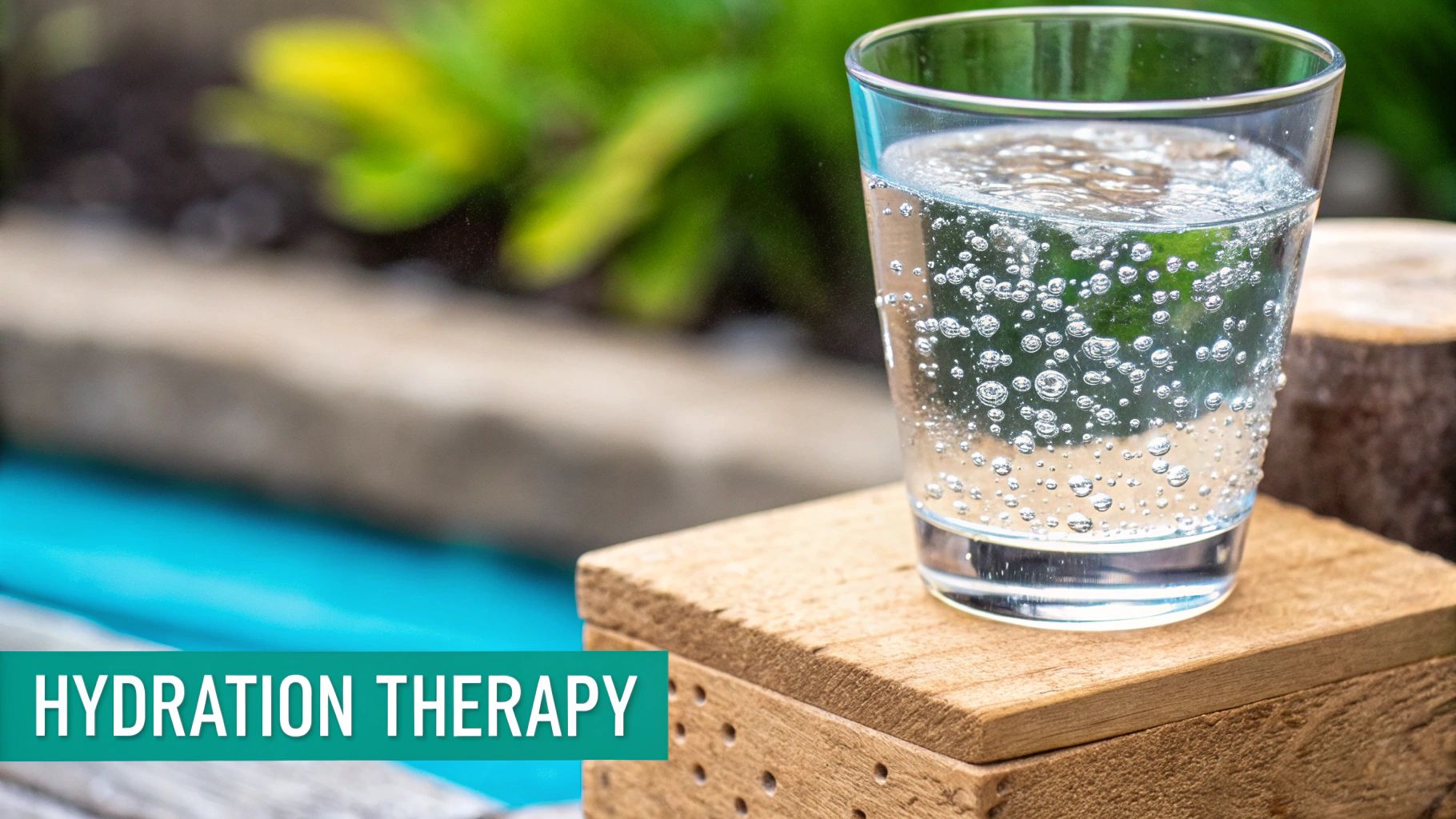
Hydration therapy encompasses various methods, from simply drinking plenty of water to utilizing specialized electrolyte solutions. It's a flexible approach that can be implemented before, during, and after alcohol consumption, making it a valuable tool for anyone looking to mitigate the negative effects of drinking. This strategy tackles the underlying physiological imbalance caused by alcohol, unlike other purported hangover cures that may only mask symptoms. While some competitors offer expensive IV treatments, often promoted by celebrities, simple and affordable at-home hydration therapy methods are frequently just as, if not more effective. By focusing on pre-hydration and consistent fluid intake, you can take control of your recovery without the hefty price tag. Learn more about Hydration Therapy
Features & Benefits:
- Replaces lost fluids and electrolytes: Addresses the core issue of dehydration.
- Preemptive & Responsive: Can be used before, during, and after drinking.
- Versatile Application: From water to specialized electrolyte drinks.
- Addresses the root cause: Targets the physiological imbalance caused by alcohol.
Pros:
- Effective for core symptoms: Noticeably reduces headaches and fatigue.
- Safe & Minimal Side Effects: Generally safe for most individuals.
- Accessible and affordable: Easy to implement with readily available resources.
- Scientifically supported: Backed by research on dehydration and alcohol.
Cons:
- Not a panacea: May not completely eliminate all hangover symptoms.
- Severe cases need medical help: Not a substitute for professional care in extreme situations.
- Time-Sensitive: Requires time for full rehydration.
Examples of Successful Implementation:
- Athletes often use oral rehydration solutions after celebratory events.
- Emergency rooms utilize IV fluids for severe alcohol-related dehydration.
Actionable Tips for Hangover Prevention and Recovery:
- Pre-Hydration is Key: Drink 16-20 oz of water before you start drinking alcohol.
- Pace Yourself & Hydrate: Alternate alcoholic beverages with water throughout the night.
- Hydrate Before Bed: Drink another 16-20 oz of water before going to sleep.
- Electrolyte Boost: Consider electrolyte-enhanced water or sports drinks for faster recovery.
- Natural Electrolytes: Coconut water is a great source of electrolytes with less sugar than many sports drinks.
Hydration therapy earns its top spot on this list of hangover cures that work because it's a safe, effective, and affordable way to combat the dehydrating effects of alcohol. By proactively addressing this root cause, you can significantly lessen the severity of your hangover and get back to feeling your best.
2. NSAIDs for Symptom Relief
Waking up with a pounding headache and body aches after a night out? Non-steroidal anti-inflammatory drugs (NSAIDs) like ibuprofen can offer effective relief from some of the most common hangover symptoms. Alcohol consumption triggers inflammatory responses throughout the body, leading to discomfort. NSAIDs work by inhibiting the production of prostaglandins, which are compounds that promote inflammation, pain, and fever. This makes them a popular choice among those seeking fast relief from hangover-related pain. This pharmacological approach directly targets key hangover symptoms, although it doesn't address the underlying cause of the hangover itself.
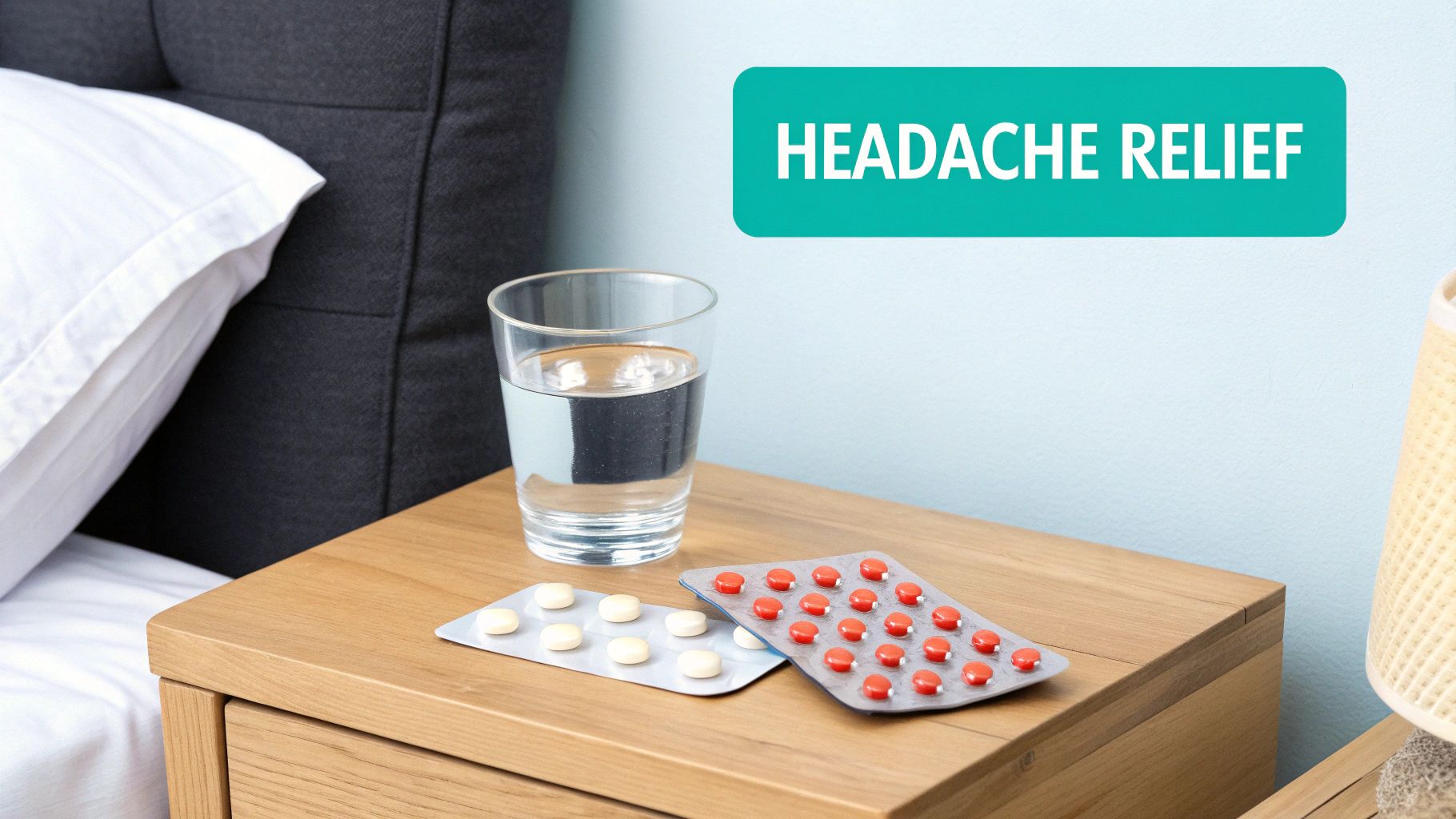
NSAIDs provide several benefits for hangover symptom relief. They effectively reduce headaches, body aches, and general pain. Their anti-inflammatory properties directly address the alcohol-induced inflammation contributing to these symptoms. They are also widely available over-the-counter in various forms, including tablets, liquids, and capsules, offering flexibility for individual preferences. Ibuprofen and naproxen are commonly used for hangover relief. While aspirin is also an NSAID, ibuprofen is often preferred for hangovers due to its lower risk of stomach irritation. Some brands specifically market ibuprofen products for hangover relief, highlighting its effectiveness in this area. Even emergency room protocols often include NSAIDs for alcohol-related headaches, further demonstrating their efficacy.
While NSAIDs can be a helpful tool in managing hangover symptoms, it’s crucial to be aware of the potential downsides. One of the most significant drawbacks is the potential for stomach irritation, especially when taken with alcohol. It's therefore essential to wait until the alcohol has been metabolized (typically the morning after) before taking NSAIDs. Another important precaution is to avoid combining acetaminophen (Tylenol) with alcohol, as this combination can increase the risk of liver toxicity. It's crucial to stay within the recommended dosage guidelines and to consult a doctor if you have any underlying medical conditions that might make NSAID use risky. Lastly, while NSAIDs provide effective symptom relief, they do not address the root causes of a hangover like dehydration.
Tips for Using NSAIDs for Hangover Relief:
- Take with food: This can help reduce the risk of stomach irritation.
- Wait until the morning after: Allow your body time to metabolize the alcohol before taking NSAIDs.
- Avoid acetaminophen (Tylenol): Opt for ibuprofen or naproxen instead.
- Follow recommended dosage: Don't exceed the recommended dose.
- Consider ibuprofen over aspirin: Ibuprofen is generally gentler on the stomach.
- Consult a doctor: If you have any pre-existing medical conditions, talk to your doctor before using NSAIDs.
This approach deserves a spot on the list of "hangover cures that work" because it offers fast-acting, readily available relief for common hangover symptoms like headaches and body aches. However, it's important to remember that NSAIDs primarily mask symptoms rather than addressing the underlying causes of a hangover. For a comprehensive approach to hangover recovery, combining symptom relief with strategies that address dehydration and replenish electrolytes is crucial.
3. B Vitamin Supplementation
Among the hangover cures that work, B vitamin supplementation stands out as a proactive and scientifically-backed approach. Alcohol consumption significantly depletes B vitamins, essential nutrients that play crucial roles in energy metabolism, brain function, and liver health. Replenishing these lost vitamins can help mitigate the severity of hangover symptoms. B vitamin supplementation, particularly B1 (thiamine), B6 (pyridoxine), and B12 (cobalamin), supports the liver in processing alcohol and helps restore normal neurological function, potentially reducing fatigue and the dreaded "brain fog" often associated with hangovers.
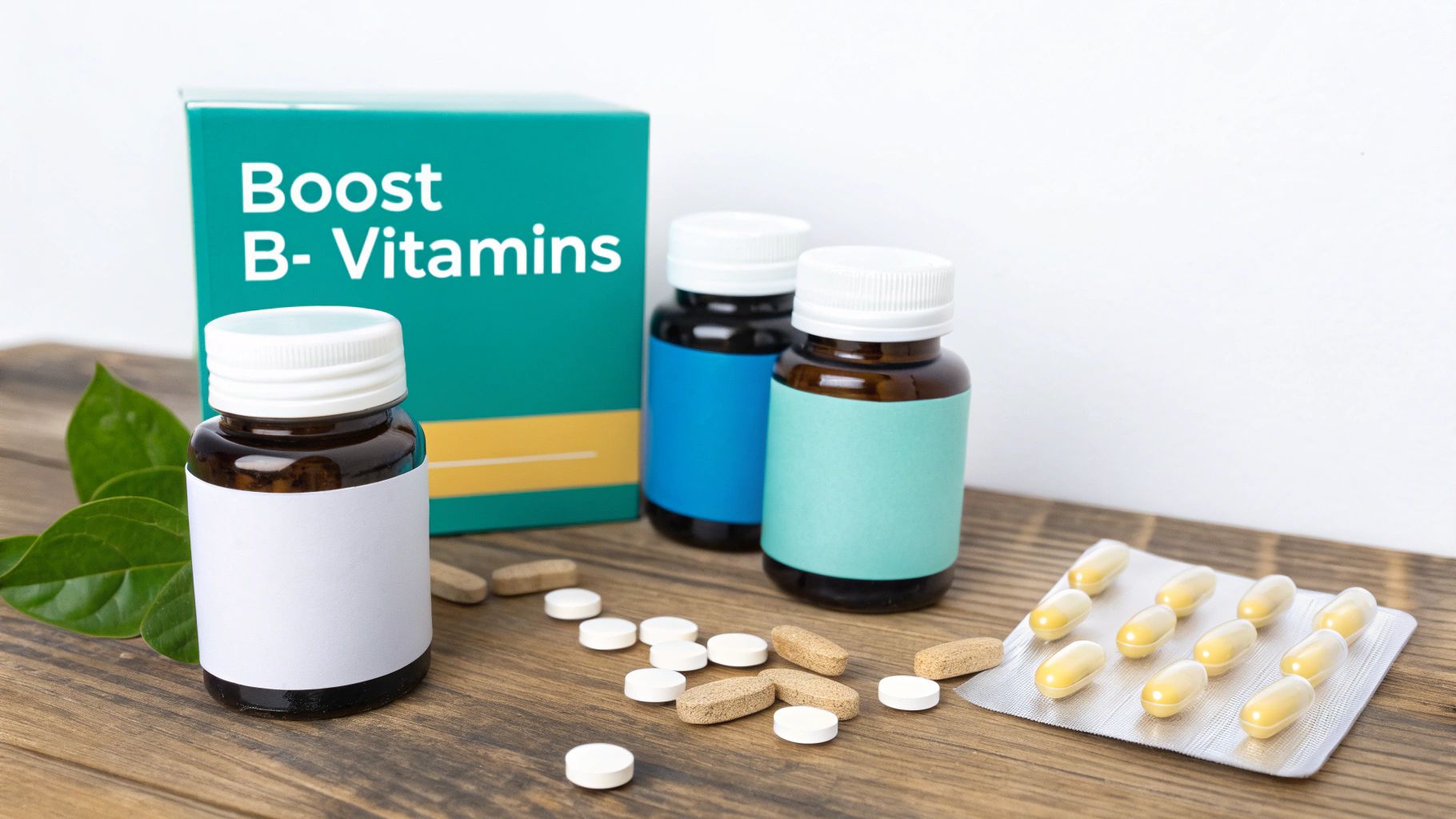
This method deserves a place on this list because it addresses a specific nutritional deficit caused by alcohol, rather than just masking symptoms. By supporting liver function and overall recovery, B vitamin supplementation offers a more holistic approach to hangover recovery. It tackles both the physical and cognitive aspects of hangovers, helping restore energy levels and mental clarity. This makes it a particularly attractive option for health-conscious individuals, busy professionals, and frequent travelers who need to bounce back quickly.
The benefits of B vitamin supplementation are numerous. It replenishes essential B vitamins lost due to alcohol consumption, supports liver function and alcohol metabolism, and directly addresses the energy dips and cognitive impairment associated with hangovers. B vitamin supplements are also readily available in various forms, including pills, sublingual tablets, and injections, catering to different preferences and needs.
While some services offer intravenous B vitamin therapy (like "The IV Doc" and similar mobile IV vitamin therapy services), it's important to weigh the cost and convenience. Such therapies can be expensive and require scheduling. Oral supplementation offers a more practical, affordable, and accessible alternative for most people.
Pros:
- Addresses a specific nutritional deficit caused by alcohol.
- Supports overall recovery and health.
- Minimal side effects when used appropriately.
- May improve mental clarity and boost energy levels.
Cons:
- Not an immediate solution for acute hangover symptoms. Works best as a preventative measure or as part of an ongoing recovery strategy.
- High doses can cause side effects like flushing or nerve problems. Always follow recommended dosages.
- Effectiveness varies between individuals.
Actionable Tips:
- Take B vitamins before drinking and again the morning after to mitigate the effects of alcohol.
- B-complex supplements offer a convenient way to get all essential B vitamins in appropriate ratios.
- Consider sublingual (under the tongue) tablets for potentially faster absorption.
- Pair B vitamin supplementation with adequate hydration for optimal effect.
- Foods rich in B vitamins, such as eggs and whole grains, can complement supplementation as part of a healthy diet.
While some products, such as Berocca, have popularized the use of B vitamins for hangover prevention, remember to focus on choosing a high-quality supplement that meets your individual needs.
By strategically incorporating B vitamin supplementation into your routine, you can take a proactive step towards minimizing the unpleasant effects of alcohol and supporting your overall well-being.
4. Electrolyte-Rich Foods and Beverages
One of the most effective hangover cures that work involves replenishing the electrolytes lost through alcohol's diuretic effect. Alcohol dehydrates the body, flushing out essential minerals like potassium, sodium, and magnesium that are crucial for proper cellular function, nerve transmission, and fluid balance. Simply drinking water can help with dehydration, but addressing the mineral imbalance directly can significantly alleviate hangover symptoms. This approach combines basic nutritional science with practical food and beverage choices, offering a targeted solution for recovery.
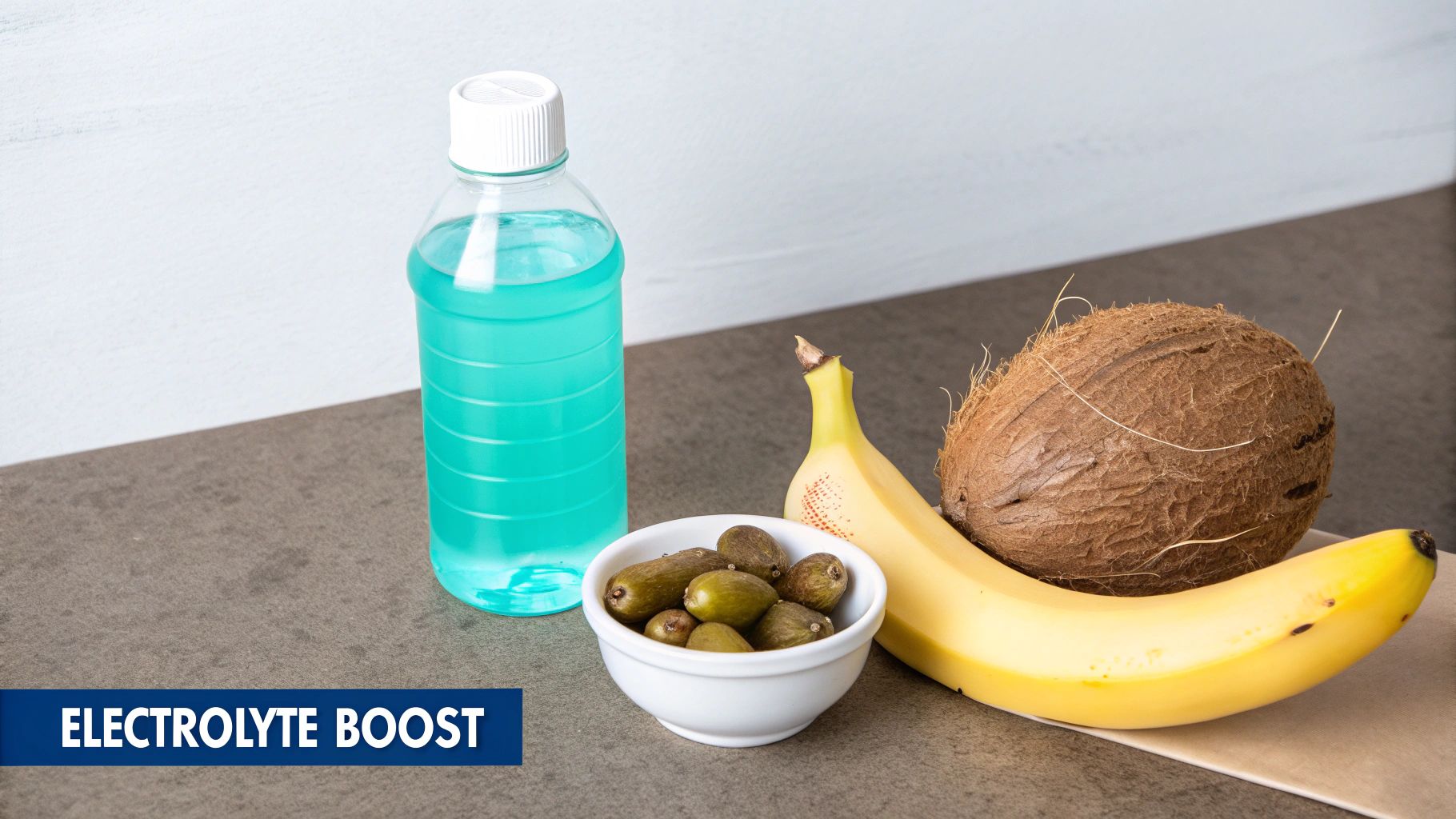
This method deserves a spot on this list because it addresses a key underlying cause of hangover symptoms: electrolyte imbalance. While some commercial products cater to this need, incorporating electrolyte-rich foods and beverages offers a more holistic and often more affordable approach. This method is particularly beneficial because it offers a variety of options, allowing for personalization based on individual preferences and dietary needs. From readily available household items to specially formulated drinks, there's an electrolyte solution for everyone.
Features of this approach include restoring critical minerals, combining hydration with nutritional support, and addressing muscle cramps and weakness, a common hangover symptom. It offers a range of choices, from readily available items to specialty products. This method has several advantages: it's often more palatable than plain water when you're nauseated, provides calories and nutrients for recovery, offers many readily available options, and can be customized based on personal preferences. However, it's important to be mindful of the cons: some commercial products have high sugar content, which can exacerbate certain symptoms, and this method alone may not be enough for severe hangovers. Certain foods might be difficult to tolerate if you're experiencing nausea, and some options may require advanced planning or preparation.
Think of it this way: while some competitors focus solely on rehydration, electrolyte replacement targets a more specific aspect of hangover recovery. Choosing the right balance of electrolytes can be more effective than generic sports drinks. Learn more about Electrolyte-Rich Foods and Beverages
Examples of Electrolyte-Rich Hangover Remedies:
- Sports Drinks: While some commercial sports drinks can be helpful, be mindful of high sugar content. Opting for low-sugar versions or diluting them with water can be more beneficial.
- Pickle Juice: This Eastern European folk remedy is surprisingly effective due to its high sodium and electrolyte content.
- Bone Broth: A traditional hangover cure in many Asian countries, bone broth offers a comforting and nutrient-rich way to replenish electrolytes.
- Coconut Water: Gaining popularity as a natural electrolyte source, coconut water is a refreshing and hydrating option.
Tips for Effective Electrolyte Replenishment:
- Choose Low-Sugar Options: Opt for low-sugar electrolyte drinks to avoid blood sugar spikes and crashes.
- Reach for a Banana: Bananas are packed with potassium and are generally easy to digest.
- Consider Miso Soup: This provides sodium, protein, and is gentle on the stomach.
- Watermelon Works Wonders: It offers hydration, electrolytes, and natural sugars.
- Avocado Power: Avocado provides potassium and healthy fats to aid recovery.
This method is particularly useful for those looking for hangover cures that work by addressing the root cause of many symptoms. Whether you're a social drinker, a nightlife enthusiast, health-conscious, a busy professional, or a frequent traveler, understanding the importance of electrolyte balance can be a game-changer in your hangover recovery strategy.
5. Hair of the Dog (Controlled Alcohol Consumption)
Looking for hangover cures that work? The "hair of the dog" is a well-known, albeit controversial, method for temporarily alleviating hangover symptoms. This approach involves consuming a small amount of alcohol the morning after a night of drinking. While it might sound counterintuitive, there's a biochemical explanation for its perceived effectiveness.
The "hair of the dog" works by temporarily halting the body's breakdown of methanol. Methanol, a toxic alcohol byproduct produced during the metabolism of alcoholic beverages, is converted into formaldehyde, a substance that contributes significantly to many hangover symptoms. By introducing ethanol (drinking alcohol) back into the system, the body prioritizes metabolizing this new alcohol instead of the remaining methanol, potentially delaying or reducing the onset of more severe hangover symptoms. This is a process known as competitive inhibition.
This traditional remedy, dating back centuries, often involves morning drinks like Bloody Marys or Mimosas. Historically, remedies like the Prairie Oyster (raw egg, Worcestershire sauce, and vodka) were also employed. Even today, combinations like beer and tomato juice are popular hangover cures in countries like Germany and Mexico.
Pros:
- Rapid symptomatic relief: The "hair of the dog" can provide quick, albeit temporary, relief from hangover symptoms.
- Reduced anxiety: For some, it can ease the anxiety associated with hangovers.
- Cultural and social acceptance: Morning cocktails are normalized in some cultures, particularly within brunch settings.
Cons:
- Delays the inevitable: This method only postpones the hangover, rather than treating the underlying cause – dehydration and the toxic byproducts of alcohol metabolism.
- Potential for dependence: This approach can contribute to continued drinking and potentially lead to alcohol dependence.
- Unhealthy relationship with alcohol: Regularly using this method can perpetuate an unhealthy relationship with alcohol.
- Interference with responsibilities: Morning drinking can interfere with work, family obligations, and the recovery process.
Tips for Safe and Controlled Use (Use with extreme caution):
- Small serving: Restrict yourself to a single, small serving of alcohol.
- Food and hydration: Pair the alcohol with substantial food and plenty of water to address dehydration.
- Set limits: Establish a strict limit before employing this method and stick to it.
- Rare exception: Consider this a rare exception rather than a regular solution for hangovers.
- Lower-alcohol options: Choose lower-alcohol options like beer or diluted spirits.
Why it's on the list: While controversial, the "hair of the dog" is a widely recognized hangover remedy. Its inclusion in this list is for informational purposes and to provide a complete picture of common hangover "cures". It's crucial to understand both its potential benefits and, more importantly, its significant drawbacks. This method should be approached with extreme caution and is not recommended as a sustainable or healthy solution for dealing with hangovers. Ultimately, focusing on preventative measures, such as moderation and adequate hydration while drinking, is the most effective way to avoid a hangover altogether. This focus on proactive health management is what distinguishes our approach from other companies who might promote quick fixes without addressing the underlying issues related to alcohol consumption. We prioritize your long-term well-being, providing information to help you make responsible choices.
This information is not intended as medical advice. If you are concerned about your alcohol consumption or experience severe hangovers, consult a healthcare professional.
6. N-acetylcysteine (NAC) Supplementation
Looking for hangover cures that work? N-acetylcysteine (NAC) supplementation might be a valuable addition to your toolkit. This amino acid isn't a magical hangover eraser, but it addresses a root cause of those dreaded morning-after symptoms, making it a standout among other purported remedies. Unlike quick fixes that merely mask symptoms, NAC tackles the underlying biochemical processes involved in alcohol metabolism.
So, how does it work? Alcohol consumption leads to the production of acetaldehyde, a toxic byproduct. Acetaldehyde is a major culprit behind hangover symptoms. Your body naturally uses glutathione, a powerful antioxidant, to neutralize acetaldehyde. However, heavy drinking depletes glutathione stores. This is where NAC comes in. It acts as a precursor to glutathione, replenishing these depleted reserves and enhancing your liver's ability to detoxify alcohol byproducts. This reduces oxidative stress, which is another key contributor to hangover misery.
NAC supplementation offers several features that make it a promising hangover cure:
- Supports glutathione production for improved detoxification: NAC directly boosts your body's natural defense against alcohol's toxic byproducts.
- Reduces oxidative stress caused by alcohol metabolism: By neutralizing free radicals, NAC helps protect your cells from damage.
- Available as an over-the-counter supplement: NAC is readily accessible without a prescription.
- Works directly on liver biochemical pathways: This targeted approach addresses the core issue of alcohol detoxification.
Pros:
- Addresses a root cause of hangover symptoms.
- Scientific evidence supports its liver-protective effects.
- May reduce the severity and duration of hangovers.
- Offers additional health benefits beyond hangover relief.
Cons:
- Best taken before drinking for a preventive effect. It's less effective once a hangover is already established.
- Can cause gastrointestinal discomfort in some people.
- Potential interactions with certain medications (consult your doctor).
Examples of NAC's Effectiveness:
The detoxification pathway boosted by NAC is so effective that emergency rooms use it for acetaminophen overdose. Functional medicine practitioners and even professional athletes utilize NAC protocols for alcohol consumers seeking recovery and improved well-being.
Tips for Using NAC:
- Timing is key: Take 600-1200mg before drinking and consider another dose before bed.
- Synergy: Combining NAC with B vitamins may enhance its effect.
- Minimize discomfort: Take with food to reduce potential stomach upset.
- Consistency: Regular use is more effective than occasional supplementation.
- Convenience: Capsule form is generally more convenient, although powder is also available.
NAC's effectiveness has been popularized by integrative medicine practitioners like Dr. Andrew Weil and promoted by supplement brands for liver health. It's also gained traction in biohacking communities for enhancing alcohol tolerance. While other companies may offer NAC supplements, (Here you would insert information about your company's specific NAC product and why it's superior, e.g., higher bioavailability, purer ingredients, added beneficial ingredients, etc. Remember to avoid promoting competitors directly.)
For those seeking hangover cures that work, NAC offers a scientifically-backed approach that goes beyond masking symptoms. It empowers your body to better handle alcohol's toxic effects, making those post-celebration mornings significantly more bearable. Remember to always consult with your doctor before starting any new supplement regimen, especially if you have pre-existing medical conditions or are taking other medications.
7. Anti-Nausea Protocols (Ginger-Based Remedies)
Waking up after a night out with a churning stomach is a familiar feeling for many. If nausea is your primary hangover hurdle, ginger-based remedies might be your ticket to a quicker recovery. This natural approach targets the gastrointestinal distress common with hangovers, making it a worthwhile addition to our list of hangover cures that work. But why does it work, and how can you use it effectively?
Ginger contains bioactive compounds called gingerols and shogaols. These powerful components work on multiple fronts: they help regulate the movement of your stomach and intestines (gastric motility), reduce inflammation in your alcohol-irritated digestive system, and even block certain serotonin receptors involved in nausea and vomiting. This multi-pronged approach makes ginger particularly effective for tackling the digestive upset that can derail your entire day.
This method deserves a spot on our "hangover cures that work" list because it directly addresses one of the most debilitating hangover symptoms: nausea. By calming your stomach, ginger makes it easier to rehydrate and replenish essential nutrients, paving the way for a faster overall recovery. While some commercial hangover remedies might offer a quick fix, ginger's natural approach offers relief without the potential for harsh side effects.
Features and Benefits:
- Natural anti-emetic (anti-nausea) properties: Ginger's effectiveness in combating nausea is backed by centuries of traditional use and modern scientific research.
- Anti-inflammatory benefits: Soothes the digestive tract irritated by alcohol consumption.
- Available in multiple forms: From fresh ginger to tea, capsules, and even candies, you can find a format that suits your preferences.
- Dual-action relief: Works on both central and peripheral mechanisms of nausea, offering comprehensive relief.
Pros:
- Generally recognized as safe with minimal side effects.
- Provides targeted relief for nausea, one of the most debilitating hangover symptoms.
- Makes it easier to consume fluids and nutrients crucial for recovery.
- Backed by a long history of traditional use.
Cons:
- Primarily addresses digestive symptoms, not headaches or other hangover aspects.
- Effectiveness can vary between individuals.
- The strong taste of ginger can be off-putting when already nauseated.
- Not potent enough for severe cases of alcohol-induced gastritis (seek medical attention if you suspect this).
Examples and Tips for Implementation:
- Fresh Ginger Tea: Steep a few slices of fresh ginger in hot water for a potent and effective tea. Add a small amount of honey and lemon to improve the taste if needed.
- Crystallized Ginger: A portable and convenient option for on-the-go relief.
- Ginger Capsules: Standardized ginger capsules (5% gingerols) offer consistent dosing. Start with a low dose if you're particularly sensitive.
- Start slow: If you're experiencing severe nausea, begin with small sips of ginger tea or tiny pieces of crystallized ginger.
While some brands like Reed's Ginger Beer and certain ginger ales have been popularized as hangover remedies or preventatives, many commercial versions contain minimal real ginger. Opting for fresh ginger, ginger tea, or ginger chews provides a more concentrated dose for optimal effectiveness.
When and Why to Use This Approach:
If nausea is your primary hangover concern, ginger is an excellent natural remedy to try. It's especially helpful if your upset stomach is preventing you from rehydrating and getting the nutrients you need to recover. Remember, while ginger can be a powerful ally in combating hangover nausea, it's not a magic bullet for all hangover symptoms. For a comprehensive approach, combine ginger with other effective strategies like proper hydration and rest.
8. Sleep and Recovery Optimization
One of the most effective, yet often overlooked, hangover cures that work involves focusing on optimizing sleep and recovery. Alcohol drastically disrupts your normal sleep architecture. While you might sleep more after a night of drinking, the quality of that sleep is significantly diminished. Alcohol reduces crucial REM sleep and causes fragmented, non-restorative rest, leaving you feeling groggy and unwell despite the extra hours. This method addresses this issue directly, targeting the disrupted sleep cycles caused by alcohol. By implementing a combination of environmental, behavioral, and sometimes supplemental interventions, you can give your body the best chance to recover.
This approach emphasizes both pre-sleep practices and optimizing your sleep environment. It works with your body’s natural recovery mechanisms, addressing the neurological and immunological processes that primarily occur during proper sleep cycles. This directly combats alcohol's negative effects on cognitive function, mood, and physical recovery. Think of it as providing your body with the optimal conditions to repair itself.
Professional athletes often prioritize sleep as part of their post-celebration recovery protocols, recognizing the vital role it plays in bouncing back. Similarly, some Silicon Valley executives have been known to utilize sleep tracking technology to optimize their hangover recovery, demonstrating the increasing awareness of sleep's importance in this context. Even traditional practices, like the Russian banya (sauna) followed by extended sleep, highlight the long-understood link between deep sleep and detoxification.
Pros:
- Addresses fundamental recovery processes, not just masking symptoms.
- No negative side effects when implemented correctly.
- Combines well with other hangover remedies.
- Benefits extend beyond hangover recovery to general health and well-being.
Cons:
- Requires advance planning and a time commitment.
- Can be difficult to implement in certain situations (travel, noisy environments, etc.).
- Not immediately effective for acute hangover symptoms.
- Quality sleep can be elusive when already hungover.
Actionable Tips for Optimizing Sleep and Recovery:
- Create a sleep sanctuary: Ensure your bedroom is cool, dark, and quiet. Use blackout curtains, earplugs, or white noise to mask disruptive sounds.
- Hydration is key, but time it right: Stay hydrated throughout the day and evening, but finish fluids 30-60 minutes before bed to avoid nighttime bathroom trips that disrupt sleep.
- Consider natural sleep support: To further enhance sleep quality and duration, consider exploring natural sleep aids like tinctures. Getting restful sleep is crucial for recovery, and natural options can help support that. Source: Tincture for Sleep: Your Natural Rest Remedy from The TN Hemp Company
- Magnesium can help: Consider taking magnesium glycinate (200-400mg) before bed. It can improve sleep quality and reduce muscle tension, which can be exacerbated by alcohol.
- Ditch the screens: Avoid screens (phones, tablets, computers) for at least an hour before sleep. This supports melatonin production, a hormone crucial for regulating sleep-wake cycles.
- Plan ahead: If you anticipate a night of drinking, schedule extra sleep time the following day. This allows your body ample opportunity to recover.
This method deserves a place on this list because it addresses the root cause of many hangover symptoms: poor sleep. While other remedies might offer temporary relief, prioritizing sleep provides long-term benefits and supports your body’s natural healing process. Learn more about Sleep and Recovery Optimization. By understanding how alcohol impacts sleep and taking proactive steps to improve sleep quality, you can significantly reduce the severity and duration of your hangovers. The popularity of books like Matthew Walker’s Why We Sleep, which highlights the restorative functions of proper sleep, along with fitness influencers emphasizing sleep for recovery, and the data provided by sleep tracking apps like the Oura Ring demonstrating alcohol's negative impact on sleep metrics, all underscore the power of sleep in hangover recovery.
Effectiveness Comparison of 8 Hangover Cures
| Method | 🔄 Implementation Complexity | ⚡ Resource Requirements | 📊 Expected Outcomes | 💡 Ideal Use Cases | ⭐ Key Advantages |
|---|---|---|---|---|---|
| Hydration Therapy | Low – drink fluids or IV in clinics | Water, electrolyte drinks, IV access | Moderate – reduces dehydration symptoms | Before, during, after drinking | Addresses root cause; safe & affordable |
| NSAIDs for Symptom Relief | Low – oral tablets/liquids | Over-the-counter meds | Fast – reduces headache and inflammation | After drinking, symptom onset | Fast-acting pain relief; widely available |
| B Vitamin Supplementation | Low to moderate – pills, injections | Supplements or injections | Moderate – supports metabolism and energy | Preventive or recovery phase | Supports liver and neurological function |
| Electrolyte-Rich Foods and Beverages | Low – food/drink consumption | Common foods and electrolyte drinks | Moderate – restores mineral balance | Recovery phase, nausea present | Nutritional support and palatable options |
| Hair of the Dog (Alcohol) | Low – controlled drinking | Alcohol and food | Temporary – delays symptoms | Rare, social, rapid relief | Rapid symptom relief; culturally familiar |
| N-acetylcysteine (NAC) Supplementation | Moderate – supplement timing | OTC supplements | Moderate – reduces oxidative stress | Preventive before drinking | Supports detoxification; liver-protective |
| Anti-Nausea Protocols (Ginger) | Low – teas, capsules, candies | Natural ginger products | Moderate – relieves nausea | Hangover nausea dominant | Safe, improves tolerance of fluids/food |
| Sleep and Recovery Optimization | Moderate – environment & behavior | Quiet, dark space, sleep aids | Moderate to high – restores brain & body | Post-drinking recovery | Enhances natural recovery; no side effects |
Choosing Your Best Hangover Strategy
Finding effective hangover cures that work is a common goal for anyone who enjoys an occasional alcoholic beverage. This article has explored eight key strategies, from pre-party hydration and electrolyte balance to targeted supplementation with B vitamins and NAC, and even the controversial "hair of the dog" approach. The most important takeaway is that a holistic approach, addressing both the causes and symptoms of a hangover, yields the best results. While some products promise quick fixes, true recovery comes from supporting your body’s natural detoxification processes. Mastering these hangover cures empowers you to take control, minimize downtime, and enjoy life to the fullest, uninterrupted by the after-effects of a night out.
Rather than relying on generic remedies, prioritize strategies tailored to your individual needs. Consider combining various approaches for a synergistic effect, such as pairing hydration therapy with electrolyte-rich foods and optimizing your sleep environment. Effective hangover cures that work empower you to regain control after a night of social enjoyment. Ready to upgrade your recovery routine? Explore Upside Hangover Sticks, a convenient and targeted way to support your body’s natural detoxification process and get back to feeling your best. Visit Upside Hangover Sticks to learn more and discover how Upside can help you conquer your next hangover.
